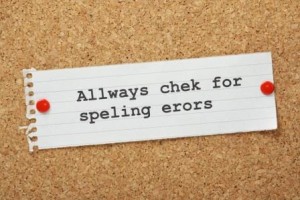Pitfalls of using a spelling checker
Proofreading is a vital part of any writing process. I credit my mother with my nearly obsessive need to proofread. As a child I had to submit my assignments to her before turning them in at school. If she found something wrong, she would tell me she found an error (or errors), but wouldn’t tell me what or where it was. It was up to me to read it over again (and again if necessary) until I found the mistake(s). As a result of several years of this, I went on to earn a livelihood finding and fixing other people’s writing errors.
Over the years it has become apparent to me that there are many people who don’t share my belief in the importance of proofreading. This leads to fewer people willing to pay to have their work checked, and more errors going to print. I wish I had a dollar for every time I’ve heard, “I have SpellCheck…” And yet even with a spelling checker, errors make it to print.
The problem with a spelling checker is what it DOESN’T catch – things like homophones (their/they’re/there; you’re/your; two/to/too) and improper use of correctly spelled words – by typo or simple confusion (Let’s meat at 6; I can’t here what you’re saying; The restaurant offers a variety of American far). Relying solely on a spelling checker doesn’t encourage anyone to improve their writing skills, vocabulary, or spelling.
As a newspaper copy editor, I caught some errors that brought laughter to the entire newsroom, as everyone had to know why I was laughing so hysterically. Often I would crack up and my editor would say “What did I do this time?” Sometimes I couldn’t get through rereading without bursting into fits. A couple of memorable mistakes that would not be caught by a spell checker, and would have gone to print if not for human eyes:
She told him before the race, she said, because she didn’t want him to hear it through the grapefruit.
The church sanctuary will be open Wednesday morning for prayer and medication.
A journalist friend of mine shared one of his most uncomfortable moments, when he had to take a call to his newspaper from an irate widow complaining about the paper printing information about her husband’s “pubic burial.”
It’s always best to have someone else proofread your work. If you’re not confident in your own spelling/writing knowledge, all the better to give it to someone you trust to read it over for you. There is no downside to proofing your work. However, remember that you know what you mean; you may not catch an error because your brain will see what you mean, and not necessarily what you wrote. It’s best to put some time in between when you write a piece and when you submit it or upload it.
(Side note: be wary of grammar checkers as well. In the paragraph above, the grammar checker wanted me to change “all the better” to “the entire better,” which of course makes no sense.)
Using the spelling checker should only be a step in the editing process–it should not be relied upon solely to make your work error-free. Growing your own knowledge of spelling and grammar is a great way to improve your writing, as are simple, old-fashioned practice and asking for feedback from people you know are good writers. I’ve also always believed reading can help improve writing. It can help improve your sentence structuring abilities, as well as your spelling. So get reading, and get writing. And remember that the spelling checker is not always your friend.



